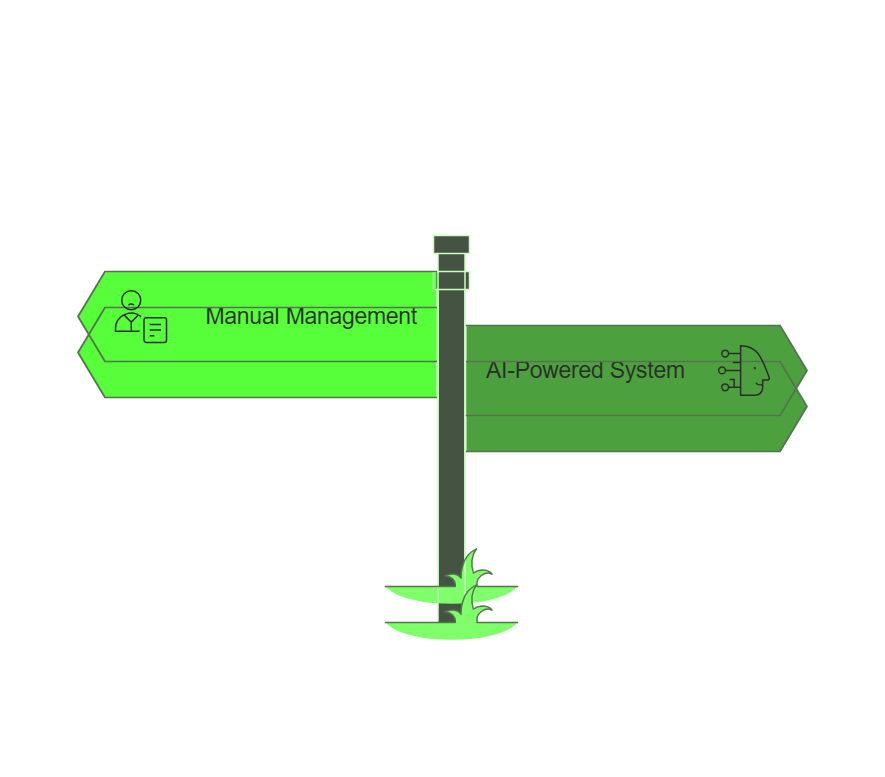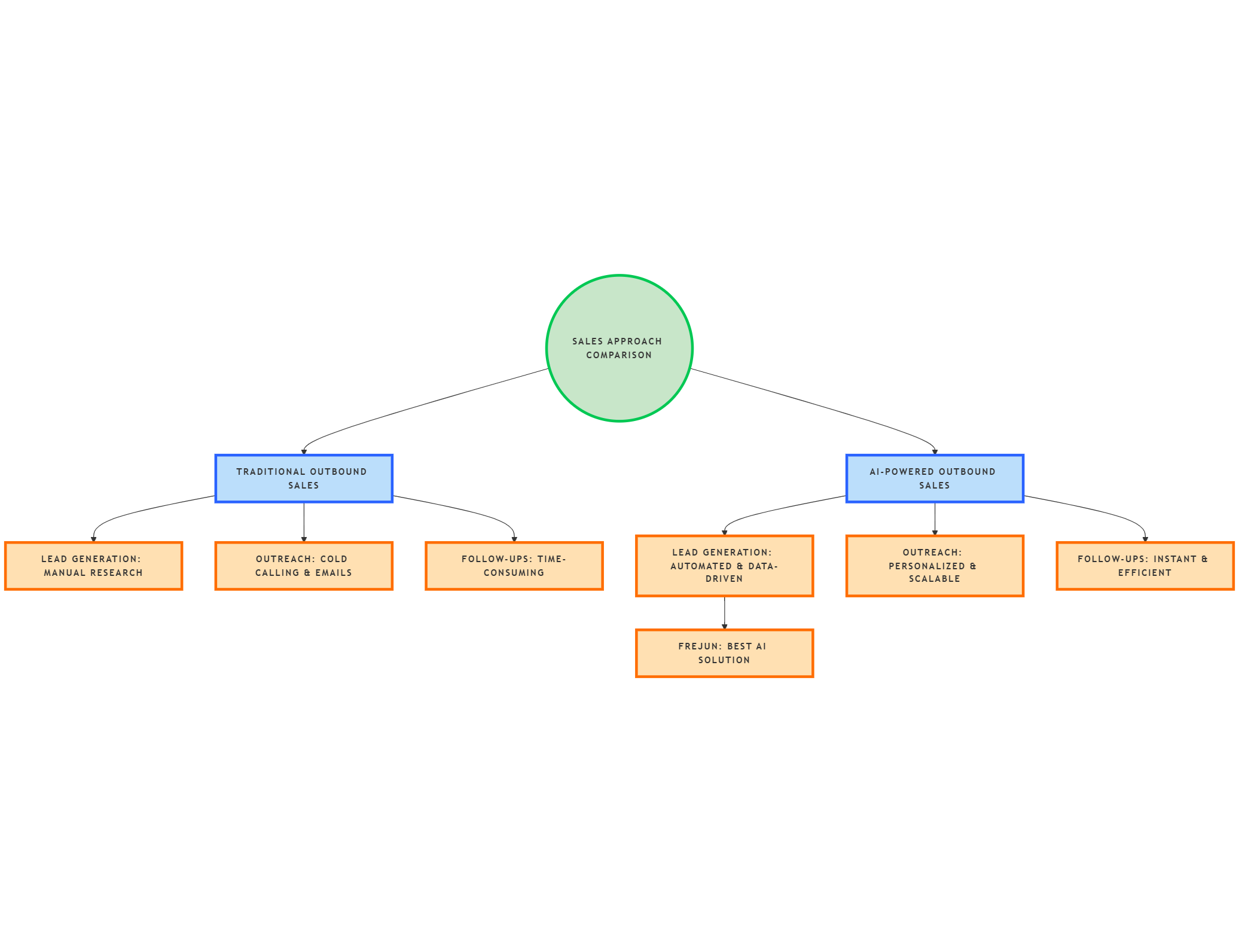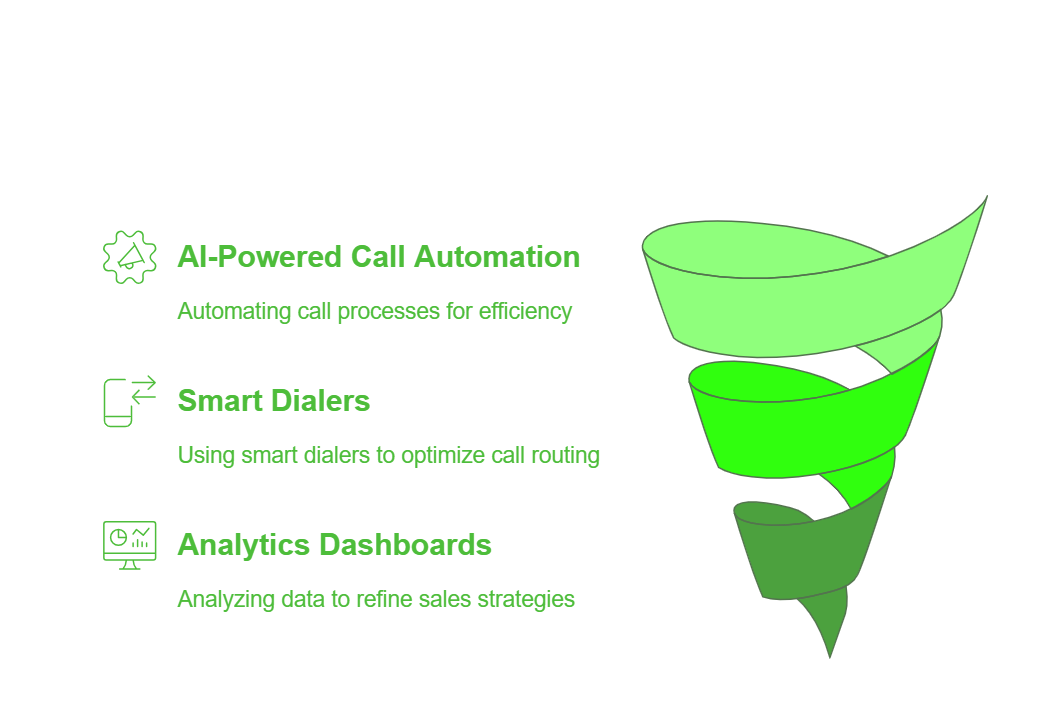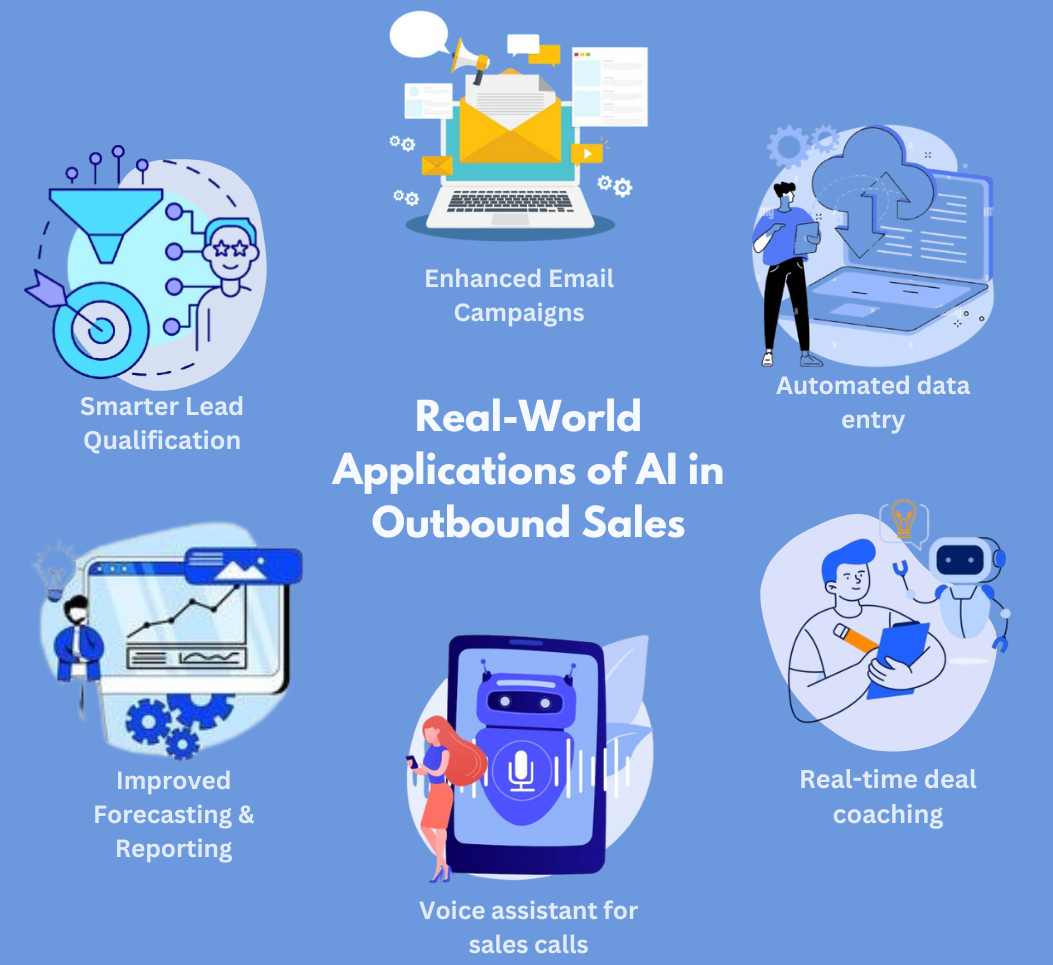Last updated on February 21st, 2026 at 11:24 am
AI (Artificial Intelligence) is changing something that we always thought was totally human – Outbound sales. The space is going through some major changes right now, thanks to rapid advancements in tech. We’re seeing a whole new approach take shape. That’s why AI-powered sales tools like Frejun is changing the game for sales teams, handling repetitive tasks and driving better lead conversion. In this article, we’ll see how these tools are reshaping outbound sales and making a big impact on efficiency, conversions, and revenue growth.
Outbound sales are evolving rapidly thanks to AI for outbound sales. Businesses are leveraging AI outbound sales tools to automate lead qualification, personalize messaging, and improve sales presentation effectiveness. In this article, we explore how outbound sales tools with advanced AI features are revolutionizing sales strategies and increasing revenue.
Table of contents
- What Is AI in Outbound Sales?
- What are AI-powered Sales Engagement Tools?
- Sales Process Management Approach
- The Evolution of Outbound Sales
- How Have these Sales Tools Transformed Outbound Sales
- Benefits of AI-powered Sales Engagement Tools
- AI in Outbound Sales
- Manual vs. AI-Powered Sales Process
- How AI-Powered Dialers are Changing the Game
- Top AI Tools Transforming Outbound Sales
- Real-World Applications of AI in Outbound Sales
- Future Trends in AI for Outbound Sales
- Conclusion
- Frequently Asked Questions
What Is AI in Outbound Sales?
AI for outbound sales refers to the use of artificial intelligence technologies to optimize the sales process. This includes automating repetitive tasks, analyzing large volumes of data, and helping sales teams make smarter decisions. With AI, teams can identify high-potential leads, predict buying intent, and craft personalized outreach messages that resonate with prospects.
By integrating AI, businesses move beyond manual dialing and generic messaging, achieving higher engagement and faster results.
What are AI-powered Sales Engagement Tools?
Tools that are designed to make outbound sales simpler and smarter. Tools like Frejun become essential for automating outreach, enhancing how sales reps connect with prospects. These tools have played a critical part in outbound sales automation. By combining automation, data-driven insights, and real-time analytics, they make each interaction more impactful.
Instead of reaching out blindly, these tools help you zero in on the people who are most likely to be interested so your efforts go where they matter most.
Sales Process Management Approach

The Evolution of Outbound Sales
To see where outbound sales is headed, it helps to know where it started.
What began as door-to-door selling has transformed into tech-driven strategies. Back in the day, sales teams manually dialed leads and stuck to rigid scripts, which often led to low conversion rates.
Today, with the help of CRM systems, automation, and social media, sales is all about personalization, trust-building, and offering real value. As buying behaviors evolve, salespeople have become more like consultants than traditional reps.
While technology streamlines outreach, the heart of successful outbound sales remains the same: building meaningful relationships. AI is taking this to the next level by optimizing workflows, delivering smarter lead insights, and scaling personalized outreach like never before.
This evolution is driven by AI-powered dialers and sophisticated sales engagement platforms that ensure more efficient and effective prospect engagement.
How Have these Sales Tools Transformed Outbound Sales
These are some strategies a business should know:
1. Data-Driven Outreach Strategies
Rajesh Jayachandran, a PhD scholar in Sales AI, opines that there’s no need to rely on manual sales methods anymore.
He says, in his LinkedIn post, “By analyzing vast data sets—such as historical sales, customer behaviors, and market trends—AI delivers more accurate sales predictions, enabling businesses to make data-driven decisions.”
This is absolutely true. AI sales engagement tools can analyze data across multiple channels—email, phone, LinkedIn, etc.— and help you to create highly targeted and data-driven outreach strategies.
They help sales teams identify when to contact leads, how to engage them, and what messaging resonates best.
2. Real-Time Performance Insights
AI offers real-time analytics by tracking key metrics like connection rates, call duration, and response times, enabling teams to make quick, data-driven adjustments to improve outreach.
3. Seamless CRM Integration
Many AI-powered engagement tools integrate with CRM systems giving sales teams a complete view of each prospect’s journey—from the first contact to conversion.
Benefits of AI-powered Sales Engagement Tools
These are some Benefits of AI Powered sales engagement tools
1. Increased Efficiency
AI-driven automation reduces manual work, enabling sales teams to reach more leads in less time and at a lower cost.
2. Higher Lead Conversion
By prioritizing high-potential leads and crafting personalized outreach strategies, AI tools increase the likelihood of converting prospects into customers. The best AI productivity tools streamline this process by analyzing data, predicting buyer behavior, and helping teams focus on the opportunities most likely to result in sales.
3. Enhanced Customer Experience
AI-powered conversations feel more natural, offering personalized and timely responses that lead to a better overall customer experience.
4. Actionable Insights
AI provides data-driven insights into sales performance, helping teams refine their strategies and continuously improve.
AI in Outbound Sales
| AI Feature | Key Benefit |
| Smart Dialers | Optimize calling efficiency |
| AI Email Sequences | Personalize outreach automatically |
| Predictive Analytics | Prioritize high-potential leads |
| AI Chatbots | Provide instant responses |
Manual vs. AI-Powered Sales Process

How AI-Powered Dialers are Changing the Game

Imagine this: you’re a salesperson. You’re chained to your desk, phone glued to your ear, running through the same script a million times. The grind is real, right? Nobody really enjoys it. Neither you nor the person on the other end of the line. Here’s where AI comes in and changes everything. It’s not just about automating those calls. It’s about making them smarter, more personalized with AI-powered dialers. Dialers have transformed outbound sales by a great deal. Unlike manual dialing, AI dialers use predictive algorithms and intelligent automation to optimize sales reps’ time and improve engagement with prospects.
1. Auto Dialing
At the core of AI-powered autodialers is predictive dialing, a system that uses AI to dial multiple numbers simultaneously and connects sales reps only when a prospect picks up.
This eliminates downtime between calls and minimizes unproductive dials, caused by busy lines or disconnected numbers.
Call prioritization algorithms take this a step further by analyzing data like past interactions, job titles, and company size to identify high-value leads. Instead of randomly dialing, sales reps are matched with decision-makers and prospects who are most likely to convert, all based on real-time insights.
2. Automated Voicemails and Call Routing
AI-powered dialers can automate the voicemail process, allowing sales reps to leave pre-recorded voicemails when a prospect doesn’t answer. This ensures consistency in messaging and saves time, allowing reps to focus on live conversations.
Advanced systems even detect voicemail tones, so the message is dropped automatically without waiting for the beep. These dialers also offer intelligent call routing, directing calls to the most suitable rep based on factors like industry, location, or previous interactions.
For example, if a prospect has already spoken with a specific rep, the system ensures the next call is routed to that same person, providing a seamless communication experience.
3. Personalized Talking Points and Conversation Insights
AI-powered dialers stand out by delivering personalized talking points during calls. By analyzing data from CRM systems, previous interactions, and publicly available information, the dialer suggests tailored conversation starters or key points increasing the relevance and impact of each call.
For instance, if a prospect recently visited your website, attended a webinar, or engaged with an email campaign, the dialer can pull this information in real time. Sales reps can reference these actions, creating more engaging and personalized conversations.
4. Predictive Behavioral Analytics
One of the most advanced features of AI-powered dialers is predictive behavioral analytics. These tools analyze a prospect’s tone, mood, and engagement level during the call, helping sales reps adapt in the moment.
For example, if the system detects disinterest or frustration in the prospect’s voice, it can prompt the rep to adjust their approach—whether by softening their tone, offering a discount, or rescheduling for a better time.
Top AI Tools Transforming Outbound Sales
| Tool | Feature | Benefit |
|---|---|---|
| Frejun AI Calling | Automated outbound calls | Saves time & increases call volume |
| Conversational AI Chatbot | Real-time messaging | Engages prospects instantly |
| AI-Powered CRM Integration | Predictive analytics & recommendations | Improves lead prioritization and sales strategy |
| AI Presentation Assistant | Dynamic content suggestions | Enhances presentation effectiveness |
Real-World Applications of AI in Outbound Sales
Several companies are already leveraging AI-powered tools to redefine their sales strategies, achieving remarkable results.

1. Smarter Lead Qualification
AI helps businesses prioritize leads more effectively by analyzing vast amounts of data, such as browsing behavior, engagement history, and firmographics.
For example, a SaaS company might use AI to identify which website visitors are most likely to convert into paying customers, enabling sales teams to focus their efforts on high-potential prospects.
2. Enhanced Email Campaigns
AI tools analyze prospect behavior to determine the best times to send emails, craft personalized subject lines, and even suggest follow-up schedules.
This ensures that emails not only reach the right inbox but also resonate with the recipient, driving higher engagement and response rates.
3. Voice Assistants for Sales Calls
This is a direct application of AI’s ‘predictive analytics’. Companies are equipping their sales reps with AI-driven voice assistants that provide real-time guidance during calls.
For instance, an AI assistant can detect keywords, track sentiment, and suggest next steps during a conversation, ensuring reps stay on message while adapting to the prospect’s needs.
4. Automated Data Entry
Manual data entry can be a time sink for sales teams. AI-powered systems streamline this process by automatically logging call details, email interactions, and meeting notes into CRM systems. This frees up time for reps to focus on selling rather than administrative tasks.
5. Improved Forecasting & Reporting
AI tools analyze historical data and current trends to provide more accurate sales forecasts. This helps sales managers allocate resources efficiently and identify potential roadblocks before they become problems.
For example, AI can highlight when a particular territory or segment is underperforming, allowing teams to adjust their strategies.
6. Real-Time Deal Coaching
AI-powered platforms like Gong or Chorus analyze live sales calls and provide actionable feedback on how reps can improve their pitch, objection handling, or relationship-building skills. This real-time coaching helps reps refine their techniques and close deals faster.
These real-world applications show that AI is not just a buzzword—it’s a game-changer for outbound sales, enabling teams to work smarter, engage more effectively, and drive better results.
Future Trends in AI for Outbound Sales
Hyper-Personalization: AI will continue to tailor messaging and sales interactions for individual prospects.
AI Voice Assistants: Sales teams will leverage AI-powered voice systems for more engaging outbound calls.
Advanced Analytics: Predictive insights will help sales teams make data-driven decisions faster.
Conclusion
AI-powered sales tools are redefining outbound sales by automating repetitive tasks, enhancing personalization, and improving conversion rates. With platforms like FreJun leading the charge, sales teams can focus on building relationships and closing deals instead of handling mundane tasks. As we move further into 2026, businesses that embrace AI-driven sales automation will gain a significant competitive edge.
Is your sales team ready to make the shift?
Further Reading: Top 7 International Calling Tools for Pakistan
Frequently Asked Questions
These are software solutions that use artificial intelligence to automate sales processes like prospecting, follow-ups, and analytics—FreJun automates outbound calls using AI.
AI can score leads, identify high-intent prospects, and personalize outreach—FreJun integrates with CRMs to call the right leads at the right time.
No, they assist reps by handling routine tasks. FreJun enhances rep productivity, not replaces it.
AI helps by predicting call outcomes, suggesting call times, and logging insights—FreJun automates these aspects efficiently.
Tasks like dialing, call logging, follow-ups, and reminders can be automated FreJun specializes in these areas.
Yes, they use data to craft relevant messages. FreJun uses call history and CRM data to personalize conversations.
Not at all. Tools like FreJun are plug-and-play with most CRMs.
AI for outbound sales uses artificial intelligence to automate and optimize sales processes, improving lead qualification, messaging, and engagement.
AI analyzes prospect behavior and suggests the most compelling presentation content, increasing engagement and conversion rates.
It allows personalized, automated messaging that adapts in real-time, improving response rates and lead qualification.
These systems engage prospects instantly, answer questions, qualify leads, and schedule meetings, reducing manual effort for sales teams.
Tools include AI-powered calling platforms, conversational chatbots, predictive CRM systems, and AI presentation assistants.
